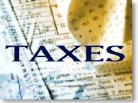|
How to avoid a tax audit
|
 |
February 24, 1999: 9:51 a.m. ET
Escape IRS scrutiny by documenting what you do and providing receipts
|
NEW YORK (CNNfn) - When it comes to avoiding tax audits, industry experts agree that the best defense is a well-documented return.
"Probably one of the most common things that causes tax audits is if someone has not shown on the return, in the proper format, all the information the IRS receives from their employers, banks and brokerage firms," said Mark D. Olander, director of audit and technical services for TaxResources Inc.
"Presentation is probably the most important thing to avoidance of the audit," he said.

Statistically, you are more likely to be flagged for an IRS audit if you are an independent contractor, a real estate agent, computer consultant or belong to a high-paying profession including medical, legal and accounting. Tax payers in those professions have been identified as common offenders of under-reported income and over-reported deductions.
To be fair, their tax returns also tend to be more complicated and therefore subject to more mistakes and closer scrutiny.
For the rest of us, the government has started cracking down on claims for charitable contributions, home office expenses, vehicle mileage and medical expenses that seem out of the ordinary.
If you plan to include any of these items on your tax return this year, be prepared to back them up with receipts, said Kay Jeffers, president of the National Society of Accountants.
"If you can substantiate what's on your return you have nothing to worry about," she said.
Do the math
Anytime you file a return that doesn't add up with the data collected by the IRS, you've got trouble.
Be aware that the government receives a 1099 INT (which stands for interest) form for each bank account you hold. They look to match each of those forms against your filing.
That being said, if you lump together information from all of your accounts into one column on your tax return, rather than breaking them out individually, your return will be pulled for closer review.
Same goes for stock dividends. "Don't do any short cuts, give as much detail to the IRS as they receive (from banks and brokerage firms)," Olander said.
Securities alert
It's also a wise idea to tread carefully if you bought or sold securities this year.
Every time you sell a stock or bond, the IRS receives a 1099 form indicating the sale price. You must therefore account for each transaction individually.

Steven G. Nair, a tax attorney and certified public accountant in Irvine, Calif., said one common mistake is the failure to appropriately spell out capital gains.
For example, if you sold 100 shares of Delta Air Lines (DAL) for $5,000, but bought them for $2,000, you may be tempted to simply claim a capital gain of $3,000 on your return.
Resist the urge.
Nair said you must identify the $5,000 as a capital gain and back out the $2,000 on another section of your return. That's because the IRS only receives information on the sale price of securities and would otherwise be unable to make sense of your return. That $5,000 would be considered unreported income.
It all comes down to "supporting what you claim and documenting what you do," Nair said.
Another common pitfall that might lead to an audit are unreimbursed business expenses. That includes travel costs and vehicle mileage.
If those items are exorbitantly high compared to your salary, Jeffers said you should spell it out for the IRS with as much detail as possible - or risk a visit by the tax collector.
Lastly, itemized deductions for home mortgage interest on your Schedule A form must match the information held by the IRS.
"Sometimes tax payers don't want to wait for their 1098 form to come in the mail and they try to calculate it themselves, but if it's even 10 cents off it'll kick it out for review," said Robin Baxter, a business and tax consultant in Sherman Oaks, Calif.
For the small business owner
Small businesses are audited roughly six times as often as individual taxpayers, according to industry data.
When Congress prohibited the IRS from randomly auditing taxpayers two years ago, Baxter said the agency's response was to identify 720 target groups for auditing.
The top three were filers of Schedule C forms (for the self-employed), anyone in the show business or entertainment industry and employees with unreimbursed business expenses.
Sole proprietors, a sub-group within the self-employed category, are hit the hardest, she said, while partnerships are the least often targeted.
For business owners, entries on the "returns and allowances" line also have been singled out as a common area for fraud. This often affects doctors, who issue patient refund checks when their client's insurance provider picks up more of the bill than expected.
"Again, it's back to the analysis picture of what do you really expect to see on this return," Olander said. "Instead, you (as a doctor) should call it 'patient refunds' and put it under refunds. The whole thing is how you present it."
Another bit of advice: Jeffers said you should avoid including items in the miscellaneous expense column on your Schedule C form.
"You can't just lump things together under that column," she said. "There has to be an explanation."
The IRS is also cracking down on office expenses, which these days have to make sense and be well-supported to keep tax collectors at bay.
"This is an area where you don't want to be sloppy," Olander advised. "Don't have large numbers under the office expenses column. Break it all out." 
--by staff writer Shelly K. Schwartz
|
|
|
|
|
 |

|

